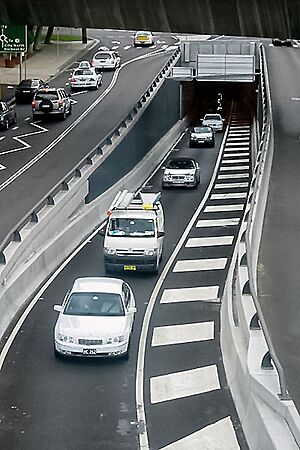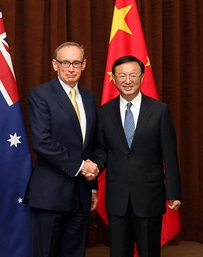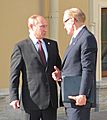Bob Carr facts for kids
Quick facts for kids
Bob Carr
|
|
|---|---|
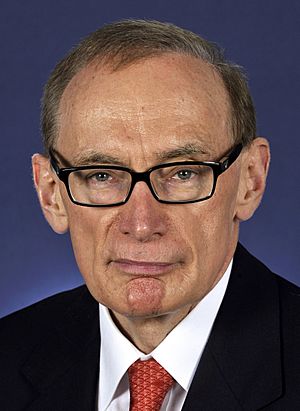
Official portrait, 2012
|
|
| Minister for Foreign Affairs | |
| In office 13 March 2012 – 18 September 2013 |
|
| Prime Minister | Julia Gillard Kevin Rudd |
| Preceded by | Kevin Rudd |
| Succeeded by | Julie Bishop |
| 39th Premier of New South Wales | |
| In office 4 April 1995 – 3 August 2005 |
|
| Monarch | Elizabeth II |
| Governor | Peter Sinclair Gordon Samuels Marie Bashir |
| Deputy | Andrew Refshauge |
| Preceded by | John Fahey |
| Succeeded by | Morris Iemma |
| NSW Minister for the Arts | |
| In office 4 April 1995 – 3 August 2005 |
|
| Premier | Himself |
| Preceded by | Peter Collins |
| Succeeded by | Bob Debus |
| NSW Minister for Ethnic Affairs | |
| In office 4 April 1995 – 3 August 2005 |
|
| Premier | Himself |
| Preceded by | Michael Photios |
| Succeeded by | Morris Iemma |
| Leader of the Opposition in New South Wales Election: 1991, 1995 |
|
| In office 11 April 1988 – 4 April 1995 |
|
| Premier | Nick Greiner John Fahey |
| Deputy | Andrew Refshauge |
| Preceded by | Nick Greiner |
| Succeeded by | Peter Collins |
| NSW Minister for Planning and Environment | |
| In office 12 December 1984 – 21 March 1988 |
|
| Premier | Neville Wran Barrie Unsworth |
| Preceded by | Terry Sheahan |
| Succeeded by | David Hay |
| NSW Minister for Consumer Affairs | |
| In office 4 July 1986 – 21 March 1988 |
|
| Premier | Barrie Unsworth |
| Preceded by | George Paciullo |
| Succeeded by | Deirdre Grusovin |
| Senator for New South Wales | |
| In office 6 March 2012 – 24 October 2013 |
|
| Preceded by | Mark Arbib |
| Succeeded by | Deborah O'Neill |
| Member of the New South Wales Parliament for Maroubra |
|
| In office 22 October 1983 – 3 August 2005 |
|
| Preceded by | Bill Haigh |
| Succeeded by | Michael Daley |
| Personal details | |
| Born |
Robert John Carr
28 September 1947 Matraville, New South Wales, Australia |
| Political party | Labor Party |
| Spouse |
Helena John
(m. 1973; died 2023) |
| Education | Matraville High School |
| Alma mater | University of New South Wales |
Robert John Carr (born 28 September 1947), known as Bob Carr, is a retired Australian politician and journalist. He is best known for being the Premier of New South Wales for ten years, from 1995 to 2005. As premier, he was the leader of the New South Wales branch of the Australian Labor Party.
Later in his career, Carr entered national politics. He became a senator for New South Wales and served as Australia's Minister for Foreign Affairs from 2012 to 2013. This role involved representing Australia to other countries around the world.
Carr was born in Sydney and worked as a journalist before starting his political career. He was known for his focus on protecting the environment and for overseeing the planning of the 2000 Summer Olympics in Sydney. After retiring from politics, he worked at the University of Technology Sydney.
Contents
Early Life and Education
Bob Carr was born in Matraville, a suburb of Sydney. He was a top student at Matraville Sports High School, graduating in 1964. He was the first person in his family to finish high school and became interested in politics as a teenager.
At just 15 years old, Carr joined the Australian Labor Party. He later studied history at the University of New South Wales.
Before becoming a full-time politician, Carr worked as a journalist for the ABC and The Bulletin magazine. He said this experience helped him prepare for his political career. He also worked for the Labor Council of New South Wales, helping with education programs.
In 1972, he met Helena John, a student from Malaysia, while on holiday. They married in 1973. Helena Carr became a successful businesswoman.
State Politics in New South Wales
Carr was elected to the New South Wales Legislative Assembly in 1983, representing the area of Maroubra. A year later, he became a government minister, responsible for planning and the environment.
Leader of the Opposition
In 1988, the Labor government lost an election. Carr was asked to become the new leader of the party in New South Wales. This made him the Leader of the Opposition, whose job is to challenge the government and present alternative ideas.
Carr was not sure he wanted the job at first. He wrote in his diary that he felt like a "doomed man" and worried it would ruin his career.
However, he did a good job as leader. In the 1991 election, his party won back many seats. Then, in the 1995 election, Labor won by a very small margin, and Bob Carr became the Premier of New South Wales.
Premier of New South Wales (1995–2005)
As premier, Carr led the state for ten years. He won two more elections in 1999 and 2003 with large majorities. He is the longest-serving premier in the state's history to serve a single, unbroken term.
His government was known for careful spending, creating new national parks, and improving schools.
Protecting Nature
Protecting the environment was very important to Carr. His government created many new national parks, including the South East Forests National Park. This saved large areas of forest from being logged. By the time he left office, his government had protected over 1.5 million hectares of land.
His government also introduced new rules to save water and energy in new homes. In 2003, it launched the world's first system for trading greenhouse gas credits to encourage electricity companies to pollute less.
Building Major Projects
Carr's government used a method called private-public partnerships (PPPs) to build big infrastructure projects. This meant the government worked with private companies to fund and build new roads and tunnels.
Major projects included the Eastern Distributor, the M2 Hills Motorway, the Westlink M7, and the Cross City Tunnel. These new roads helped create a ring road system around Sydney.
The 2000 Sydney Olympics
Carr's government was in charge during the planning and construction for the 2000 Summer Olympics. The event was a huge success for Sydney and Australia. Carr was proud that the Games were fully paid for without leaving the state in debt.
Resignation
After ten years as premier, Bob Carr announced his resignation on 27 July 2005. He felt it was time for a new leader. He was succeeded as Premier by Morris Iemma.
Federal Politics and Foreign Minister
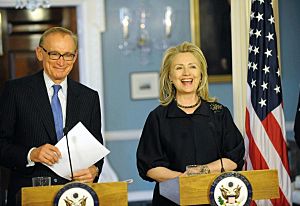
In 2012, seven years after leaving state politics, Carr returned to public life. Prime Minister Julia Gillard asked him to become a senator and serve as Australia's Minister for Foreign Affairs.
As Foreign Minister, Carr's job was to manage Australia's relationships with other countries. He focused on several key areas:
- United Nations Security Council: He led a successful campaign for Australia to win a temporary seat on the UN Security Council, one of the most important groups in the world.
- Arms Trade Treaty: He pushed for a global agreement to control the sale of weapons and stop them from getting to dangerous groups. The treaty was passed by the UN.
- Asia-Pacific Relations: He worked to build stronger ties with countries in Southeast Asia, especially Indonesia and Myanmar.
- China: He made several trips to China to strengthen Australia's relationship with the country, focusing on trade and diplomacy.
Carr resigned from the Senate in October 2013 after the Labor party lost the federal election.
Life After Politics
After retiring from politics for the second time, Carr took on roles at several universities. He became the director of the Australia-China Relations Institute at the University of Technology, Sydney. He also became a professor at the University of Sydney and the University of New South Wales.
Carr has written several books, including a diary about his time as Foreign Minister. He continues to be interested in public issues, such as protecting the environment and promoting literacy.
For his work, Carr has received many awards. He was given an award for his service to conservation and was made a life member of the Wilderness Society.
See also
 In Spanish: Bob Carr para niños
In Spanish: Bob Carr para niños
- Second Gillard Ministry
- Second Rudd Ministry
Images for kids
-
Carr meets Nobel Peace Prize laureate and Myanmar parliamentarian Aung San Suu Kyi in June 2012
 | Aaron Henry |
 | T. R. M. Howard |
 | Jesse Jackson |


